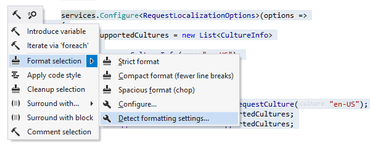Proveedor oficial
Como distribuidores oficiales y autorizados, le suministramos licencias legítimas directamente de más de 200 editores de software.
Ver todas nuestras marcas.
ReSharper
ReSharper C++
ReSharper Ultimate

Aumente su productividad con .NET.
Chatee en vivo ahora mismo con nuestros especialistas en licencias de JetBrains.